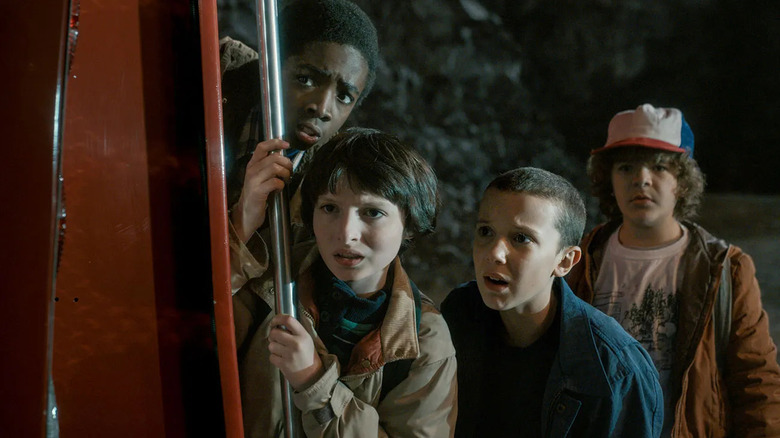Just How Much Money Has Stranger Things Earned Netflix?
Although viewers may tease "Stranger Things" for its long gaps between seasons and the disorienting aging of its main child cast, the series is undeniably a major hit. It's referenced everywhere, its merchandise can be found at seemingly every major store, and the release of each new season shares a similar vibe to the release of a massive box office-shattering blockbuster.
But how much money has the series actually made? It's hard to tell exactly with streaming shows, but the available data sure implies it's made a fortune. According to data firm Parrot Analytics (via TIME Magazine), the series has earned an estimated "2 million new subscribers and over $1 billion in revenue for Netflix since 2020."
It's important to note that season 1 of "Stranger Things" aired four years earlier in 2016, where it became an instant smash success. In fact, with season 3 airing in 2019 and season 5 not even out yet, that $1 billion estimate is even more impressive: it comes during a period where the show only aired one season, or nine episodes. By the time season 5 wraps up, the show's total lifetime revenue should be well over $2 billion.
The massive financial success of "Stranger Things" is what's helped justify the show's ballooning budget. Season 5 is rumored to have cost around $50 to $60 million an episode, numbers nearly unheard of in the TV industry. "It's a little scary," Matt Duffer, co-creator of the series, told TIME. "It puts pressure on every season because it has to perform better than the one before it to continue to justify growing the scale of the show."
Is Stranger Things the new Star Wars?
Part of what makes the sheer scale of this show's success hard to measure is that the franchise isn't only profiting from its direct viewership, but from its merch. As TIME noted, "For the final season, they are trying to achieve 'Barbie'-level cultural saturation with 'Stranger Things' partnerships: Nike sneakers, Pandora jewelry, Squishmallow stuffies, 'Dungeons & Dragons' games, and even Palermo's frozen pizza." The show has also "spawn[ed] Halloween costumes, a Tony-winning play, an upcoming animated series, and — if all goes well — at least one spin-off."
The profitability of "Stranger Things" doesn't merely come from its viewership numbers today, but from how easy it'll be for Netflix to milk its brand in the years ahead. To survive an increasingly competitive streaming environment, Netflix has leaned more heavily on its best-performing pre-existing intellectual properties, and no original Netflix show seems like a safer bet right now than this one.
It's hard not to look at this and think of "Star Wars," a franchise that's proved enduring not just because of the original movies but because of all the toys, books, costumes, and spinoffs that came out of them. Today, "Star Wars" is a franchise so large it would take a lifetime to read or watch every bit of media attached to it, and it seems like Netflix wants "Stranger Things" to reach a similar size. This may be a tough feat for "Stranger Things," a show without the massive sandbox that is the "Star Wars" galaxy to play around in, but at the current rate, it seems like Netflix will try to pull it off anyway.
"Stranger Things" season 5 premieres on Netflix on November 26, 2025, with the final episodes debuting a month later on December 25 and December 31.

